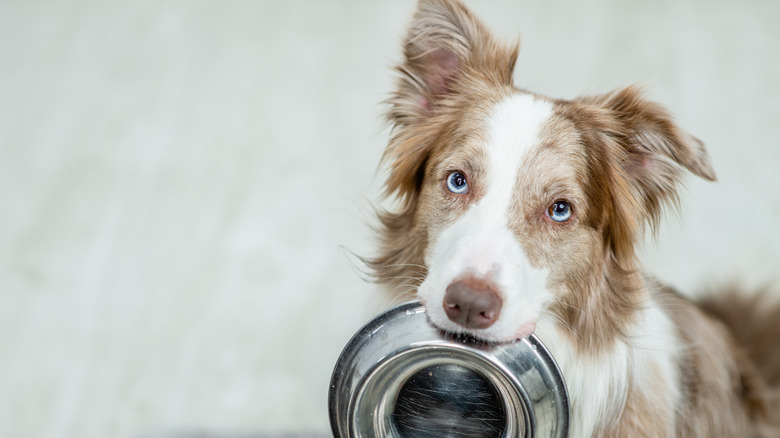Foods You May Not Know Can Cause Allergies In Your Dog
Like people, dogs can have allergies to certain foods. Per the Cummings School of Veterinary Medicine at Tufts University, allergies occur when a dog's immune system interprets an ingredient as a harmful foreign body and induces an immune reaction to fight it. A food allergy should not be confused with food intolerance, however. Personalized dog food brand Nom Nom explains that food intolerances, which are more common than allergies, do not feature an immune response but instead represent an ingredient that a dog's digestive system can't process properly. Typically, food intolerances lead to gastric symptoms, while food allergies mostly manifest through skin symptoms. However, more severe cases of food allergies can also result in gastrointestinal symptoms, and flare-ups can cause significant discomfort for a dog.
The process of identifying what your dog is allergic to can be difficult, but a small selection of ingredients is known to be the most common culprits. Becoming familiar with these ingredients can be extremely helpful, especially because they frequently appear in foods that many dog owners feed their pets on a daily basis.
What are the most common food allergens for dogs?
Dogs can be allergic to a wide range of foods, but the most common ingredients that tend to elicit immune reactions from a lot of dogs are ones that most pet owners don't realize can be problematic. According to VCA Animal Hospitals, the most common substances to cause food allergies in dogs are proteins. Ingredients such as beef, wheat, dairy, chicken, eggs, lamb, and soy are frequent instigators of immune reactions, per Rover. These ingredients also happen to be common ingredients in many pre-made pet foods, which may contribute to the fact that they're the top food allergens. Cesar's Way, the official website of renowned dog behavioralist Cesar Millan, explains that other foods that commonly cause allergies in dogs are pork, rabbit, fish, and corn.
Classic symptoms of food allergies in all pets, including dogs, are hives and itchiness, irritated skin, swelling, sneezing, watery eyes, and ear infections (via American Kennel Club). Your pet may also experience gastric symptoms such as vomiting or diarrhea, which can also be signs of a more serious illness and require medical attention. If your dog experiences these symptoms repeatedly or for longer than a few days, it's time to see your vet.
How to treat your dog's food allergies
While you can relieve symptoms with medication, the best course of action is to remove the food that your dog is allergic to from its diet. Unfortunately, protecting your dog from allergies isn't as simple as cutting out all of these ingredients at once, as many pet foods include traces of them — even if they're not listed on the packaging. Additionally, cutting out all of these foods will likely result in your dog experiencing nutritional deficiencies. To avoid this problem, your dog will need to be tested under the guidance of a vet.
Per Dutch, an online veterinary care service, allergy testing is usually conducted through an elimination diet, with most vets recommending either a novel protein diet or a hydrolyzed protein diet. In both diets, which are usually followed for roughly 10 weeks, the vet will advise you on what to feed your dog. To avoid interfering with the results, no other food may be given during the diet. According to PetMD, there are also over-the-counter tests you can conduct, but these are less accurate. If you try to get to the bottom of your dog's allergies without the input of a vet, you risk failing to precisely identify the allergens, along with potentially causing nutritional deficiencies.
Once you know what foods your dog is allergic to, you can work with your vet to come up with a healthy diet that will fulfill their needs and avoid triggering a flare-up.


